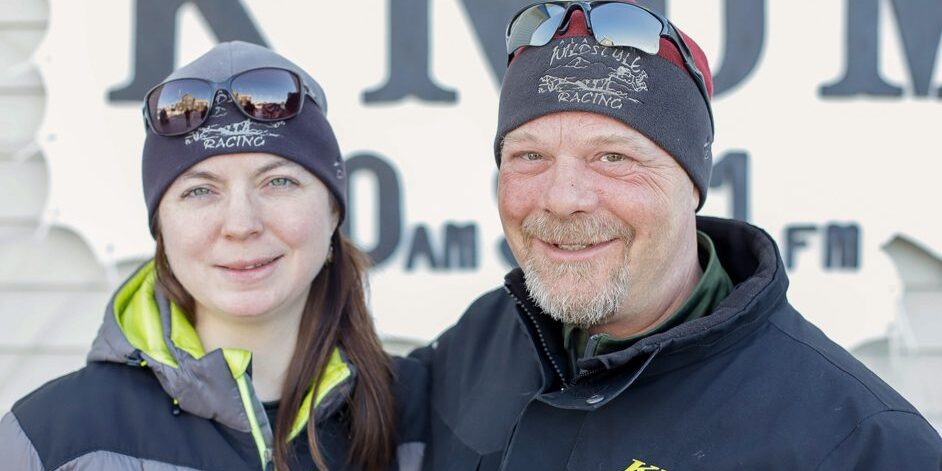Aaron Burmeister finished the 2022 Iditarod sled dog race the evening of March 15 in 8th place. Even though bringing an Iditarod win home to Nome has continued to elude him, after more than 20 years of competing, Burmeister said it’s time to focus on other parts of his life. KNOM has this report on what could be Burmeister’s last Iditarod.
Just before midnight Tuesday, Aaron Burmeister was greeted by the St. Lawrence Island Dance Group, dozens of locals, and rows of vehicles as he pulled under the burled arch in Nome after nine days, eight hours and 35 minutes on the trail.
Burmeister has been competing in the Iditarod since his rookie run in 1994. He was rookie of the year, coming in 37th place with a finish time of 14 days, 10 hours and 33 minutes. But he said mushing has been a part of his life since his father finally let him feed the dog team on his own as a young tween.
“And I kind of took over the kennel at that point, between the ages of 11 and 12 and the breeding program, and everything else,” Burmeister explained. “A gentleman named Roger Roberts, the Loafer from Ophir, lived up here in the late ’80s through the early ’90s. And he kind of took me in as a coach, and spent a lot of time working with me and coaching me through races, getting me ready for my first Iditarod and Junior Iditarods.”
In the 1970s and ’80s, the Burmeister dog team featured bloodlines from Issac Okleasik and Herbie Nayokpuk. Multiple dog generations later, his kennel still contains a mix of that original breeding with the Loafer from Ophir’s dogs which was incorporated into his family’s kennel in the 1990s.
At this point, Burmeister said he can only be at his Wildstyle kennel working with his dog team four or five months out of the year. While he’s working his career job, the one that pays the bills, he relies on fellow musher Tony Browning to train with his dogs and care for them on a daily basis. Burmeister knows that affected his bond with his dog team every race.
“That’s a weakness I’ve always had to overcome and it’s something that if you can’t give something 100% then it’s hard to do. I’d love someday, maybe once I retire from my career, from working, to get back in dogs. But it depends on what my wife is interested in. The kids may be grown up by then, but shoot, I’ll be a lot older,” Burmeister said.
He also emphasizes that he is not “retiring” from mushing, nor is he quitting. Sled dogs will still be part of his life.
Burmeister has finished as high as second last year during the Gold Loop trail, third back in 2015 on the southern route, with many top ten finishes over his mushing career. Before this year’s Iditarod, Burmeister was planning to stop racing for a while, potentially even forever. And after finishing another Iditarod without a victory, Burmeister said he wants to spend more time with his family and on other aspects of his life.
“Yes, that little chip is going to be on my shoulder for the rest of my life until I attain it or maybe I won’t. But that competitiveness in me definitely, really wants to bring that victory home to Nome. That’s been a goal since I was a child,” Burmeister said. “But a difference in my lifestyle is, a lot of these mushers, a lot of these people that I’m competing against, their life, their everything revolves around dogs, 365 days a year.”
Besides owning a kennel in Nenana with 28 dogs, Burmeister is also the general manager of Tumet Industries, a contracting company based in Nome that does construction projects across the Bering Strait region and beyond.
Working a full time job, plus spending time with his family prevents Burmeister from committing all of his energy to dog mushing and training.
He said his trip through Norton Sound communities this year was very emotional, not only because he knew he wasn’t going to win at that point in the race, but also because many people came out to support him and ask him about why he wasn’t going to compete in the Iditarod anymore. Burmeister told KNOM that hearing that made it much harder to walk away from the race.
“I just want to thank everybody. It’s been incredible. Sorry I couldn’t’ bring a victory home to Nome, we’ve been working at it a long time. Maybe someday we’ll be back at it, or maybe come in different ways, maybe support the race or support somebody else to help them get to that level. It’s been a lifelong goal, a lifelong commitment and we put everything into it,” Burmeister said.
Despite shifting his focus away from competitive mushing, Burmeister said he will continue to give back to Western Alaska in any way he can, whether it be through the Iditarod or his work with Tumet.
“My goal every day when I’m traveling is: If I can make an impression on one person today, that person down the road will make an impression on one more and one more. So I always try to have that attitude, because it improves lives,” Burmeister explained.
Even if Burmeister doesn’t enter into next year’s Iditarod, Wildstyle kennel will still be represented by Eddie Burke Jr. Burke ran Burmeister’s puppy team in this year’s Kuskokwim 300 and placed 12th in his rookie run.
Image at top: Aaron Burmeister and wife Mandy outside KNOM station in Nome (Photo Jeff Chen of Alaska Public Media)




